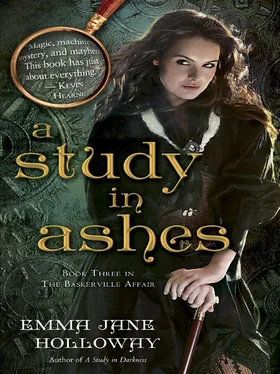Mycroft raised an eyebrow. “I suppose medical expertise would come in useful, but the decision about the team wasn’t yours to make.”
“My piece of the game,” Sherlock said firmly, “my rules. Come along, Watson, let us leave my misanthropic sibling to his repast.”
“Sherlock,” Mycroft replied, irritation leaking into his tone. “We need to have a conversation about this.”
“In due course, brother mine. Perhaps when it is all over with.” With that, he swept from the restaurant, stopping only long enough to inform the maître d’hôtel that Mr. Mycroft Holmes would be covering their bill.
“I do hate being the youngest,” he purred. “My brother never lets me pay.”
Being a good servant, the maître d’ only bowed.
Watson hurried after Holmes into the fading afternoon. The detective aimed his steps toward the riverbank, where the golden gaslights were already shedding their glow. It was gloomy and growing cold, with a mist already forming over the water.
“I did not follow a word of that exchange,” Watson grumbled. “Dartmoor? What, pray tell, is in Dartmoor?”
“A great many wild ponies, from what I hear,” said Holmes. He swung his walking stick with a jaunty air. The chaos of the street eddied around them, but he seemed oblivious to it. “The game is a-hoof, Watson.”
“We have a case?”
“Indeed. Let me paint for you three facts. One, word has been put about that a dangerous criminal has escaped from the Dartmoor prison, thus giving the excuse for soldiers to roam the countryside without arousing the curiosity of the local population. But it is not a common prisoner they seek. Second, the local baronet, Sir Charles, well known for his philanthropy, was the one to find the escaped convict roaming the moor. A smart and capable old gentleman, loyal to our queen, he had the good sense to raise the alarm with the right people. Third, he has just been found dead. Word has it that he was murdered.”
“There is hardly a case there,” said Watson. “My guess is that Sir Charles died because he helped the convict.”
“In all probability, you are standing closer to the truth than you know—but as always, facing the wrong way.”
“You already know who did it? Where is the entertainment in that?”
Holmes didn’t answer, but flagged down a cab. Once they had climbed inside, he resumed. “I need your literary talents, Watson. I need you to spin something out of these events.”
“I always do.”
“No, I need your invention beforehand.” Holmes fiddled with his walking stick impatiently. “Fiction is your purview. Concoct a reason that I will require my niece to join us. Something supernatural that only her talents can unravel.”
Watson knew little of magic, but he liked Evelina. Nevertheless, his conscience pricked him. “Isn’t that a bit tawdry, Holmes? A man has died. Why use his death as cover for our own purposes?”
“I would not be stretching truth too far if I said more may die unless we can free my niece.”
“Why? How can she prevent death?”
Holmes gave him a dark look. “Humor me.”
Watson made a gesture of surrender. “Very well, then. A family curse perhaps? A banshee?”
“This is Dartmoor, not Scotland.”
“A ghost?”
“Rather dull, don’t you think?”
“I don’t know,” Watson said, growing annoyed. “What do they have there besides ponies? Little shaggy horses don’t make terribly convincing monsters. The Dread Pony of Dartmoor, whickering death to carrots across the—”
“No, it doesn’t quite work, but you’ve got the idea. There are rumors of a savage dog roaming the place. Perhaps you can work with that.”
“Tell me the truth. Is this all a plot to get Evelina free?”
The detective made a face. “I require utter secrecy.”
“Always.”
“This morning I received word from a Miss Emily Barnes, a confidante of the renowned medium Madam Thalassa. Her group is assembling to assist in the dismantling of a laboratory notorious for experimenting on live human subjects without their consent.”
“Wait a moment.” Watson reached across the cab and grabbed his friend’s arm, pulling him close so they would not be overheard. “You’re speaking of Her Majesty’s Laboratories? No one knows where that is.” As soon as he said it, everything fell into place.
Holmes’s gray eyes were hard as flint. “One of their charges escaped. I could regale you with word of their atrocities, but let us say for now that Nellie Reynolds is giving the performance of her lifetime.”
His shock sharper than the cold river wind, Watson let go of Holmes and reeled back against the seat cushions. His wits scrambled to right themselves. Surely this was treason—and yet Holmes’s loyalties were never in question. And then Watson did his mental sums. Sir Charles? “Don’t the Baskervilles live somewhere in Dartmoor?”
Holmes nodded slowly. “A dreadful coincidence, is it not? The murder victim was Sir Charles Baskerville. He found Nellie Reynolds wandering the moors and contacted Madam Thalassa. His adopted son, Edmond, is the one directly involved with a rebellion against the Steam Council. I have been acquainted with Edmond Baskerville for some years.”
Watson’s mouth went dry. “What are you proposing?”
“That we catch a killer, of course, and you make a story about the adventure.”
“And what are we really doing?”
“You are the medical doctor. Is there not an oath to do no harm? Might that promise extend to stopping those who break that oath?”
Watson bowed his head. What Holmes was proposing was insanely dangerous. But then so was the moral damage of ignoring an abomination like the laboratory on the moor. And he was a widower now. He was free to take risks because there was no one waiting at home—just a lot of empty echoes reminding him that he had failed kind and pretty Mary Morstan when the fever took her. “There is an oath. We all swear to uphold it.”
Holmes crossed his long legs. “Then we are going to free my niece and unleash the one thing on the Steam Council that they fear.”
“What is that, Holmes?” Watson feared that he already knew the answer.
“Magic. We are going to free the magic users and burn Her Majesty’s Laboratories to the heath.”
“Magic? You, Holmes?”
“Rebellions are won with logic, but also with passion.”
Rebellion! Cold terror trickled through Watson’s gut. “Won’t that be the next best thing to a declaration of war?”
Holmes gave a smile that was gone in an instant. “I’m afraid that horse has already left the stable—or that pony the moor. No one has admitted it yet, but the war has already begun. And this is the piece of it you and I have agreed to take on.”
Watson folded his arms. He’d seen war already, and he hadn’t much liked it. “I’m glad we had a good luncheon first.”
October 2, 1889
SOUTH OF LONDON
1:30 p.m. Wednesday
THE SCHOOLMASTER HURLED AN ACORN AT MICHAEL EDGERTON, hitting the back of that morning’s Bugle with a resounding clatter. The paper dropped and his friend’s scowl appeared over the top.
“Are we bored?” Edgerton asked dryly, shifting his back against the tree trunk where he was leaning.
It was a lovely morning, if one were a sightseer. Birds chirped, the sun shone, and the air was filled with the rich scent of early autumn. Part of the Schoolmaster’s prickly mood was the pain of having to resist the urge for an impromptu holiday.
Instead he kicked at a stone, sending it hurtling into a patch of brambles. “I’m wondering how I plan to rule an empire when I can’t organize one party of people for a train journey of a few hundred miles. This should not have taken two days.”
Читать дальше








